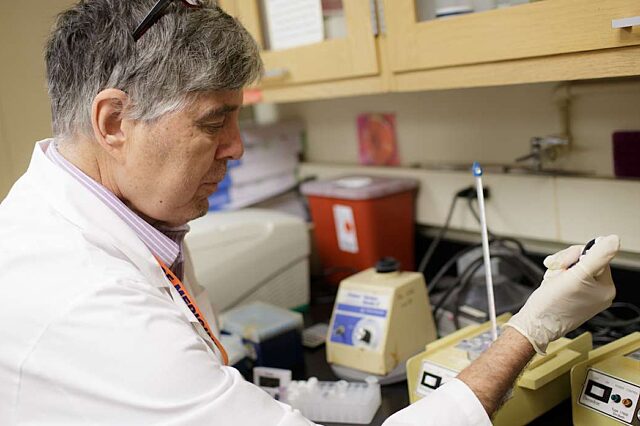- Investigator
- Stephen Anton
- Status
- Accepting Candidates
Sepsis
Definition
Sepsis is an illness or complication in which the body has a severe overwhelming response to infection. This response can induce tissue damage, organ failure and death. What differentiates sepsis from infection is the significant host response to an infectious virus, bacteria, fungus or parasite, often including organ dysfunction.
Many people have never even heard the term sepsis, even though it is currently the most expensive in-hospital condition in America and is responsible for more deaths in the United States than AIDS, prostate cancer and breast cancer combined. In fact, data analysis indicates that sepsis contributes to one in every two to three in-hospital deaths.
Causes
The symptoms of sepsis are not caused by the germs themselves, but rather the response of the body to the germs. A bacterial infection anywhere in the body may set off the response that leads to sepsis. The most common infections include those of the lung, urinary tract, gut or skin.
Common places where an infection might start include the:
- Bloodstream
- Bones (common in children)
- Bowel (usually seen with peritonitis)
- Kidneys (upper urinary tract infection or pyelonephritis)
- Lining of the brain (meningitis)
- Liver or gallbladder
- Lungs (bacterial pneumonia)
- Skin (cellulitis)
For patients in the hospital, sites of infection can also include intravenous lines, surgical wounds, surgical drains and sites of skin breakdown, known as bedsores or pressure ulcers.
Symptoms
Sepsis can be difficult for many people to recognize, as the symptoms may not be specific to only sepsis. However, sign and symptoms can include:
- Shivering, fever or feeling very cold
- Extreme pain or discomfort
- Clammy or sweaty skin
- Confusion of disorientation
- Shortness of breath
- High heart rate
In the most extreme cases of sepsis, blood pressure can drop, resulting in what is defined as septic shock. This can induce even worse failure of major organs and body systems because of poor blood flow, including but not limited to, the kidneys, liver, lungs and central nervous system.
Exams and Tests
Rapid diagnosis is a key component to a person surviving sepsis. The health care provider will examine the person and ask about the person's medical history. The infection is often confirmed by a blood test/culture. However, a blood test may not reveal infection in people who have been receiving antibiotics. Some infections that can cause sepsis cannot be diagnosed by a blood test.
Other tests that may be done include:
- Blood differential/ White blood cell count
- Blood gases
- Kidney function tests
- Platelet count and fibrin degradation products, to check for bleeding risk
- Lactate level
Treatment
It is absolutely vital that sepsis be treated rapidly. A person with sepsis will be admitted to a hospital, usually in the intensive care unit (ICU). Antibiotics are usually given through a vein (intravenously). Sometimes a patient will require an operation to resolve the source of infection.
Oxygen is often given to a septic individual and he or she will require large amounts of fluids, given through a vein.
Other medical treatments include, but are not limited to:
- Medicines that increase blood pressure
- Dialysis if there is kidney failure
- A breathing machine (mechanical ventilation) if there is lung failure
The septic patient needs to be reassessed often, especially in the first 24-48 hours, to make sure he or she is improving and that all the therapies instituted are correct and working.
Outlook (Prognosis)
Sepsis is often life threatening, especially in people with a weakened immune system or a long-term (chronic) illness. In addition, young children (one year or younger) and the elderly (65 years or older) are more likely to become septic and have a poor outcome from the condition.
Damage caused by a drop in blood flow to vital organs such as the brain, heart and kidneys may take time to improve. There may be long-term problems with these organs.
Not all patients survive an episode of sepsis.
Prevention
Getting all recommended vaccines, as well as managing all chronic medical conditions optimally with your health care provider can reduce the risk of sepsis. In addition, knowing the signs and symptoms can improve early recognition and subsequent treatment.
In the hospital, careful hand washing can help prevent infections that lead to sepsis. Prompt removal of urinary catheters and IV lines when they are no longer needed can also help prevent infections that lead to sepsis.
References
- http://www.sepsis.org/
- http://www.cdc.gov/vitalsigns/sepsis/
- https://www.hcup-us.ahrq.gov/reports/statbriefs/sb204-Most-Expensive-Hospital-Conditions.jsp
- JAMA. 2014 Jul 2;312(1):90-2. Hospital deaths in patients with sepsis from 2 independent cohorts. Liu V, Escobar GJ, Greene JD, Soule J, Whippy A, Angus DC, Iwashyna TJ. PMID: 24838355 DOI: 10.1001/jama.2014.5804
- JAMA. 2016 Feb 23;315(8):801-10. doi: 10.1001/jama.2016.0287. The Third International Consensus Definitions for Sepsis and Septic Shock (Sepsis-3).
- Singer M, Deutschman CS, Seymour CW, Shankar-Hari M, Annane D, Bauer M, Bellomo R, Bernard GR, Chiche JD, Coopersmith CM, Hotchkiss RS, Levy MM, Marshall JC, Martin GS, Opal SM, Rubenfeld GD, van der Poll T, Vincent JL, Angus DC
Reviewed
8/31/2016
Philip A. Efron, MD, FACS, FCCM, Associate Professor of Surgery and Anesthesiology, Division of General Surgery, Department of Surgery, University of Florida College of Medicine, Gainesville, FL.
Clinical Trials: Sepsis
UF Health research scientists make medicine better every day. They discover new ways to help people by running clinical trials. When you join a clinical trial, you can get advanced medical care. Sometimes years before it's available everywhere. You can also help make medicine better for everyone else. If you'd like to learn more about clinical trials, visit our clinical trials page. Or click one of the links below:
- Investigator
- Philip A Efron
- Status
- Accepting Candidates
- Status
- Accepting Candidates
News and Patient Stories: Sepsis
Study: Immune system markers may be key for early detection, prognosis prediction in sepsis
December 15, 2023
Sepsis arrives silently. A body’s infection-response gone wrong, the condition’s early symptoms include subtle harbingers like changes in breathing, cognition…
Department of Surgery, +3 more

Stopping Sepsis: Understanding the Signs and Symptoms
Sepsis is like an ember that sparks from a small campfire, suddenly threatening the whole forest. If not treated early, it can progress into septic shock. The…

Latest podcast episodes
Improving your senses may slow mental decline
Maintaining keen senses as you age might help keep something else sharp: your mind. Specifically, surgery to fix cataracts may slow mental decline, new research suggests. People suffering from...
